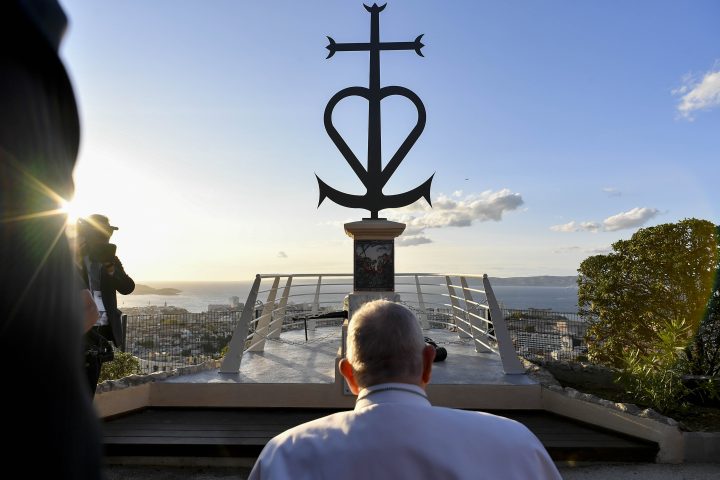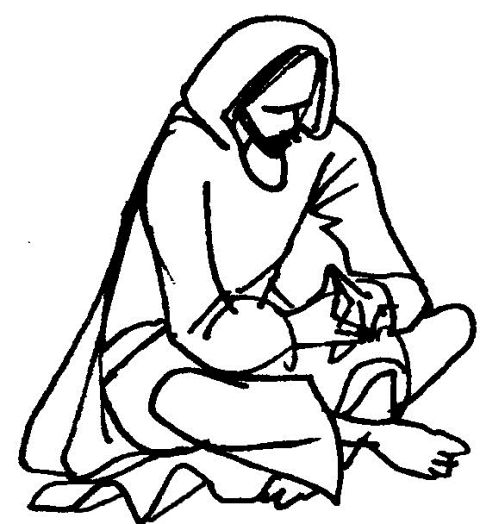
The Spirit drove Jesus out into the desert. That’s no two-cent word! The word Mark chose to explain how the Spirit prompted Jesus into the desert is the same word the Gospels use to refer to driving out demons, to people « cast out » into the darkness and to Jesus’ eviction of the people who had turned the temple into a marketplace. Mark tells us that the Spirit impelled Jesus to go apart immediately after his baptism. Was it to seek the meaning of what he had seen and heard at the baptism? He did have a lot to meditate on after the heavens were torn open, the Spirit descended upon him and the voice proclaimed, « You are my beloved Son, with you I am well pleased. »
No Gospel tells us why Jesus decided to submit to John’s ritual. Mark, who wrote the first Gospel, might have seen Jesus’ baptism as a symbol of his incarnation and the mortality it implied (Philippians 2:5-8). In baptism, Jesus had made himself one with people who were putting their whole heart and soul into metanoia, a graced decision that impelled them to break free of narrow visions that restrict hope. Unlike Matthew and Luke who describe Jesus’ temptations as a recapitulation of Israel’s history and of different approaches to being Messiah, Mark gives us precious few details: Jesus spent 40 days; he was tempted; he was accompanied by wild beasts and angels. That’s it.
Perhaps Mark is giving us a clue for interpretation with that last phrase, « He was among wild beasts and angels ministered to him. » Even more than Matthew and Luke’s description of the temptations of bread, temple and idolatry, this phrase depicts Jesus as entering into the heart of contradictions: the implacable and frightening forces of nature and the spiritual realities hidden in all matter testifying to what is beyond the palpable. It seems that Jesus may have been driven into the desert to discern about what was deepest in himself, God’s hopes for creation, and how the two were to go together.
Jesus’ being driven by the Spirit reveals that he was particularly sensitive to God’s movement in the world and was seeking to experience God even more profoundly. To do that, anyone, Jesus included, needs to take time apart. Jesus’ sojourn in the desert was like a prolonged Sabbath — a time of leisure, of setting aside his own projects to allow God to touch and re-form his imagination.
The verses of Psalm 25 that we pray in today’s liturgy could well have been the psalm on Jesus’ lips as he wondered in the desert. This prayer could lead us through our 40 days of Lent.
When we are sincere in praying, « Make your ways known to me, » we open ourselves, like Jesus, to being impelled to escape from our ceaseless activity. This prayer calls us, strange as it may sound, to the « discipline of leisure. » It allows wonder to lead us beyond what we think we know.
Pope Francis recently said as much when he urged a dialogue group of Marxists and Christians to dream, to allow dreaming to give them the ability to be creative and the courage to take risks. Francis told them that dreaming leads toward grasping God’s own dream for creation.
When we pray, « Remember that your compassion and love are from of old, » we instinctively know that God needs no reminders, rather, we need to ponder our experiences of God’s compassion and give thanks for those who have revealed God’s love to us. Doing so, we’ll understand the truth of the phrase, « Good and upright are you, Lord, showing sinners the way. » This prayer puts us in touch with God’s invitation to us — sometimes gentle, sometimes terrifyingly impelling.
The First Letter of Peter expresses this invitation in terms of cultivating a clear conscience. We usually think of conscience as a call to remember our sin and repent. Following Jesus’ example in the desert, we can rethink that. « Conscience » combines the words « con » (with) and « science, » thus, Christian conscience describes a way of knowing together with God. That is exactly what Jesus sought in the desert, he took the time to know with God and understand what he was called to be and do.
As we begin Lent, rather than choose something to give up, a more radical approach could be to commit to taking the leisure that allows us to dream beyond our current horizons. That would bring us into the realm of the kind of sacrifice that consecrates our time. It leads us to go, like Jesus, into the sacred activity of coming to know ourselves and our world from God’s perspective.
Beware! Taking time for sacred leisure can make us vulnerable to being driven like Jesus.



